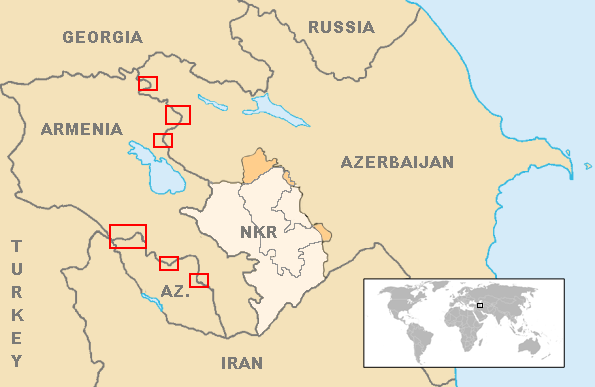Russian Brokered Ceasefire Draws Ire from Armenians
Jasmine DeLeon
Staff Writer
On November 9, Russian President Vladimir Putin, Azerbaijani President Ilham Aliyev, and Armenian Prime Minister Nikol Pashinyan signed a ceasefire agreement to end the recent fighting in the Nagorno-Karabakh region.
The Russian-brokered deal allows Azerbaijan to keep the territory it captured in recent months and requires Armenia to cede territories it has occupied since the 1990s. The agreement requires that Stepanakert, the capital of the Nagorno-Karabakh region, remain under Armenian control, reports The New York Times. According to BBC News, about 2,000 Russian peacekeepers will enforce the agreement and guard the “Lachin corridor,” a pass that connects Stepanakert to Armenia.
This ceasefire agreement comes after six weeks of violent fighting, three failed ceasefires, and thousands of deaths that began in late September in the Nagorno-Karabakh region. According to Al Jazeera, Armenia reports over 2,300 servicemen casualties. Azerbaijan, however, has not disclosed its military casualties. The Associated Press reports that the violence that has taken place over the past couple of months has been the “biggest escalation” in the long-standing conflict between the two countries. According to The New York Times, the recent fighting is a part of a complicated ethnic conflict that dates back to the war between Azerbaijan and Armenia in the late Soviet period. The tension between the two countries has roots going as far back as the fall of the Ottoman Empire.
After the deal was signed, there were mixed reactions from both the leaders and the public in Azerbaijan and Armenia. Armenian Prime Minister Nikol Pashinian stated that the agreement “is not a victory but there is not defeat until you consider yourself defeated.” In comparison, Azerbaijan President Ilham Aliyev called the agreement a “glorious victory,” reports The Washington Post.
Many Azerbaijanis feel a sense of victory now that they can return to their previous homes. The New York Times reports that an outburst of celebrations happened in Baku, the capital of Azerbaijan. The war between the two countries in the 1990s ended with the expulsion of Azerbaijanis from the Nagorno-Karabakh region and surrounding areas. BBC Foreign correspondent Orla Guerin states “overall, the deal should be read as a victory for Azerbaijan and a defeat for Armenia.”
Many Armenians are opposed and disappointed with the cease-fire agreement. According to The Washington Post, thousands of people gathered in Yerevan, the Armenia capital, in protest of the peace deals. On Nov. 11, opposition party leaders called for the resignation of Prime Minister Nikol Pashinian at a rally.
On Nov. 13, ethnic Armenians burned their homes in Charakter, a small village in the Kalbajar district that borders Nagorno-Karabakh, before leaving the area that would eventually be under Azerbaijan control, reports Reuters. According to Al Jazeera, at least 10 houses were burned and power lines in the area were cut. In response to the burnings, Azerbaijani presidential aide Hikmet Hajiyev stated that “Armenians are damaging the environment and civilian objects” and that “environmental damage, ecological terror must be prevented,” reports The Los Angeles Times.
On November 15, Azerbaijan announced, at the request of Armenia, that the takeover of the region would be delayed until Nov. 25. Hajiyev stated that worsening weather conditions will make a withdrawal from the soon-to-be Azerbaijan territory more difficult, according to the Associated Press.
Russia became involved with the peace deal because it is an ally of Armenia, has a military base in the country, and it is a part of the Collective Security Treaty Organization with Armenia. Russia also has ties with Azerbaijan, who is allied with Turkey, a country Moscow has worked with in the past to broker peace between Armenia and Azerbaijan. Russia has also been selling weapons to both countries, reports BBC News.
Turkey will join Russia in monitoring the ceasefire agreement. President Putin stated that Turkey and Russia will work together “given that we have a very good experience of cooperation in the Middle East, including in Syria, where we organize joint patrols both in the Idlib zone and on the border between Syria and Turkey.” On Nov. 17, the Turkish parliament voted to approve deploying peacekeepers to Azerbaijan, reports the Associated Press.
On Nov. 17, U.S. Secretary of State Mike Pompeo stated that the United States will provide $5 million in humanitarian aid to NGOs and other international organizations to “support local efforts to provide food, health, shelter, and other emergency assistance to conflict-affected persons,” according to a state department press release.



